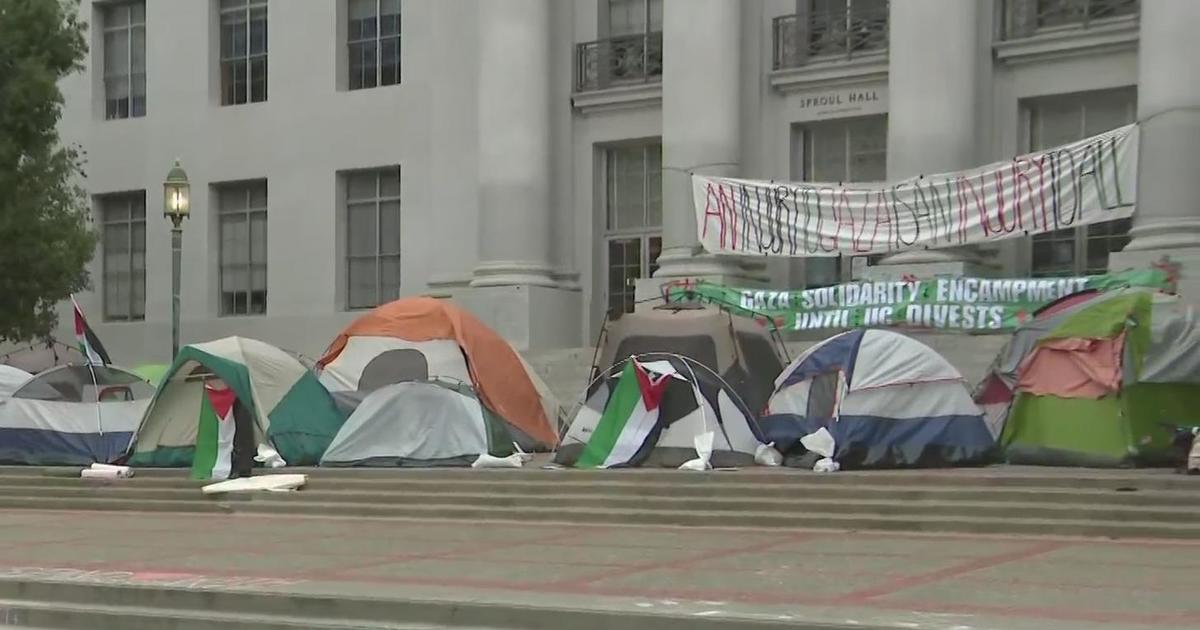Future Uncertain For Tenants In Rent-Controlled Building On UC Berkeley Campus
BERKELEY (KPIX 5) -- In a sea of bright orange brick that marks the grandiosity of the University of California, Berkeley campus, tenants inside a 111-year-old building on Walnut St. are fighting to keep their heads above water.
"I think all of them feel, myself and all the neighbors, we were in utter shock," tenant Kim Romero said.
On April 20, in the midst of this global pandemic, Kim Romero and her husband Theo Robinson received a letter informing them that they might have to move, which would mean giving up their rent-controlled apartment that goes for less than $1,000 a month.
"It's just callous, I really couldn't believe it," Romero said.
"It's really distressing. I can't think of a more inappropriate time to do a pre-eviction notice than during a pandemic," said Robinson. "Kim and I work very hard, we love our jobs but we're not sure if we'll have jobs in a few weeks."
"So just to be clear, we haven't yet completed the purchase, and if we do complete the purchase, we haven't yet decided what will happen to the building," said UC Berkeley spokesman Dan Mogulof.
According to Mogulof, the letter was only sent out at this time because the university is legally required to notify tenants of the potential for displacement. The letter specifically states "this is not a notice to vacate." Tenants won't be asked to move until after shelter-in-place is lifted.
"Our number one issue as students is housing," said UC Berkeley graduate Varsha Saveshwar, adding that finding a place to live on campus is nearly as competitive as getting in.
"There are some units in the City of Berkeley for student apartments that can receive anywhere between 40 and 60 applications in a typical spring semester," Sarveshwar said.
The Walnut St. building could be redeveloped as part of the Gateway Project which could house as many as 1,000 students. The original plan for this project did not include redeveloping the Walnut St. home.
Sarveshwar spent time on campus advocating for additional housing units to be built. She says she supports more housing, but knows students don't want to further gentrify Berkeley.
"We want the campus to participate in building housing stock that allows more people to live in Berkeley not building housing stock that's pushing out low-income people from living in this city," she said.
If these rent-controlled apartments were on Berkeley city property, the units could not be destroyed. Berkeley city law requires that rent-controlled units be preserved and that the tenants be given the option to stay but on UC Berkeley's campus, that law does not apply.
"I would just ask the university to move slowly here and consider the loss of these units as something that would be a tragedy for the city," City Councilmember Kate Harrison said.
Harrison is looking for a last-minute solution. She's asking the Berkeley Community Land Trust to consider stepping in to purchase the building so the city doesn't risk permanently losing 12 affordable apartments.
"I understand UC offers relocation benefits to the tenants, that only helps them in the short term" Harrison said. "What we're concerned about is the long-run maintenance of affordable housing and rent-controlled units."
There is no timeline in place for when the purchase will be finalized. If Romero and Robinson move now they forfeit their rights to relocation assistance from the university which could be substantial. For Romero it's added ambiguity in the most uncertain of times.
"It's like the one thing that feels stable right now, given everything the economy, jobs, health, life, it's pretty crazy to then have your own home be threatened during all of this," Romero said.
Even with the relocation assistance from the university, for Romero and Robinson, leaving this unit likely means saying goodbye to the Bay Area.



